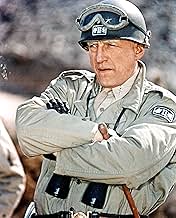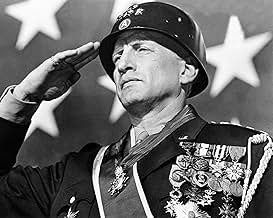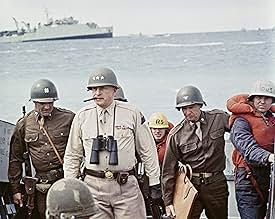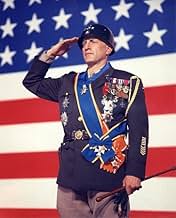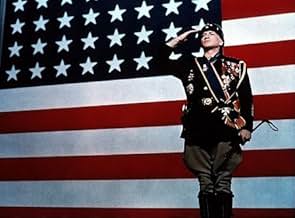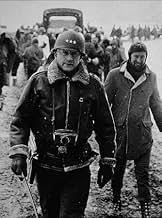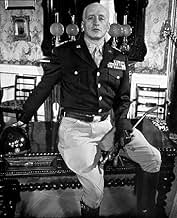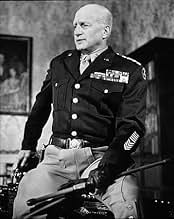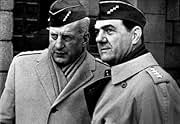Die Zeit des Zweiten Weltkriegs in der Karriere des umstrittenen amerikanischen Generals George S. Patton.Die Zeit des Zweiten Weltkriegs in der Karriere des umstrittenen amerikanischen Generals George S. Patton.Die Zeit des Zweiten Weltkriegs in der Karriere des umstrittenen amerikanischen Generals George S. Patton.
- 7 Oscars gewonnen
- 25 Gewinne & 8 Nominierungen insgesamt
- General Bradley's Driver
- (as Cary Loftin)
- First Lieutenant Alexander Stiller
- (as Patrick J. Zurica)
- Colonel General Alfred Jodl
- (as Richard Muench)
Best Picture Winners by Year
Best Picture Winners by Year
Handlung
WUSSTEST DU SCHON:
- WissenswertesThe movie begins without showing the 20th Century-Fox logo, or any other indication that the film is starting. At military bases across the US theater owners reported that soldiers in the audience would often stand up and snap to attention when they heard the movie's opening line ("Ten-hut!"), assuming it to be a real call to attention.
- PatzerContrary to the way it's portrayed in the film, the controversy over George S. Patton's Knutsford speech was not over his having insulted the Russians (in fact, the Army quickly revised the initial transcript of his remarks to reflect that he had mentioned them). It had to do with his talk of "ruling the world" after the war - members of Congress said he had no business as a general commenting on post-war political affairs, while others objected to the notion of the US, Britain or anyone else "ruling the world."
- Zitate
Translator: Excuse me sir, but General Caskov would like to know whether you'll join him to drink the surrender of Germany.
Patton: My compliments to the General. Please inform him that I do not care to drink with him or any other Russian son of a bitch.
Translator: [Nervous] I can't tell him that!
Patton: You tell him that. Tell him word for word.
Translator: [In Russian] He says he will not drink with you or any Russian son of a bitch.
Russian general: [In Russian] Tell him he is a son of a bitch, too. Now!
Translator: [Very nervous] The General says he thinks you are a son of a bitch, too.
Patton: [laughing] All right, I'll drink to that; one son of a bitch to another.
- Crazy CreditsOne of the very, very few Twentieth Century-Fox films in which that company's logo is not shown at all, beginning or end. The film simply begins with the opening speech, and the opening Fox logo is replaced with an in-credit text-only notice after the speech. However, recent television showings have added the logo (not on DVD prints), and the addition is obviously spliced in from another piece of film.
- Alternative VersionenThe Italian version is approximately 20 minutes shorter and removes all scenes set in the German Military HQ and/or showing German officers: although the credits still include the names of German performers, like Karl Michael Vogler as Marshall Rommel, their characters never appear onscreen in the Italian release.
- VerbindungenEdited into Fireball Forward (1972)
- SoundtracksTo the Colors
(uncredited)
Traditional bugle call used in lieu of the National Anthem. Played at the opening scene.
George C. Scott's performance of Patton is one I consider the greatest given of any war film. Patton is a champion for freedom while sometimes equally as much of a tyrant as the ones he's trying to put down, he's a monster and a hero, and neither he nor the filmmakers give a damn about political correctness. I found the character to be an overly harsh prick, myself, but in some strange way, very likeable and sympathetic, and when watching the movie again I don't look at the screen and say, `Hey, there's George C. Scott.' Instead it's, `Hey, there's Patton.' Not very many film characters have a personality strong enough to overtake the actor playing them. I appreciate that depth and that degree of realism, this attention to detail on the parts of Scott and Schaffner.
Schaffner surprised me by somehow managing to capture my interest on a subject matter I'd ordinarily write off as too silly (Planet of the Apes); two years later, he applied that same technical know how, craft, and intelligent storytelling towards a film whose subject appeals to me from the get go, and once again I'm impressed. There are some great war films out today; however, Schaffner's take pursued the most unique perspective in all realms, and captured my imagination with such ease . . . I can't help but come back to it over other war films.
And I have to comment on the score, which is not only one of my favorite Goldsmith scores but also one of my favorite war-film scores. Jerry Goldsmith matched point for point the brilliance of Franklin Schaffner's vision, the depth of George C. Scott's performance, and somehow managed to captured the essence of both musically. A good music score is one that tells the story of the film in its own unique voice. Goldsmith's score has such a prominent voice in the experience of Patton, that to remove it would be the equivalent of removing Schaffner's direction or George C. Scott.
Lastly, how accurate is the film? Not a clue, and even if it is completely false, I don't care. I've never been about writing history papers based on cinema experiences. All I know for certain is that Patton is a very entertaining and well balanced movie that holds up very well thirty years later, and it's a film that can be admired for its craft.
- jaywolfenstien
- 1. Dez. 2003
- Permalink
Top-Auswahl
- How long is Patton?Powered by Alexa
Details
- Erscheinungsdatum
- Herkunftsland
- Offizieller Standort
- Sprachen
- Auch bekannt als
- Patton
- Drehorte
- Cabo de Gata, Almería, Andalucía, Spanien(desert scenes)
- Produktionsfirma
- Weitere beteiligte Unternehmen bei IMDbPro anzeigen
Box Office
- Budget
- 12.000.000 $ (geschätzt)
- Bruttoertrag in den USA und Kanada
- 61.749.765 $
- Weltweiter Bruttoertrag
- 61.749.765 $
- Laufzeit2 Stunden 52 Minuten
- Farbe
- Seitenverhältnis
- 2.20 : 1
Zu dieser Seite beitragen




